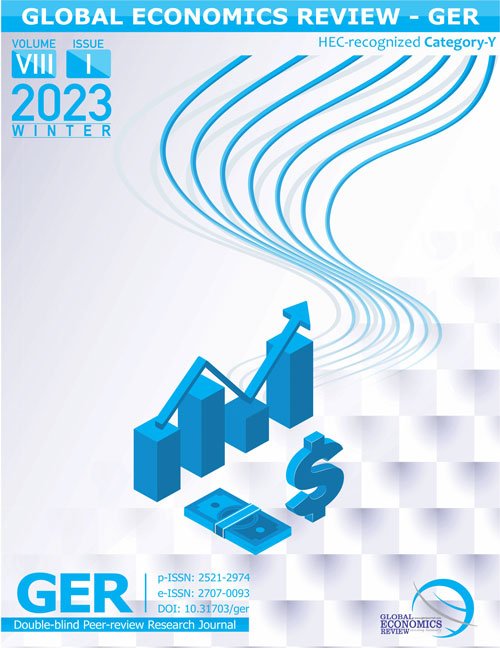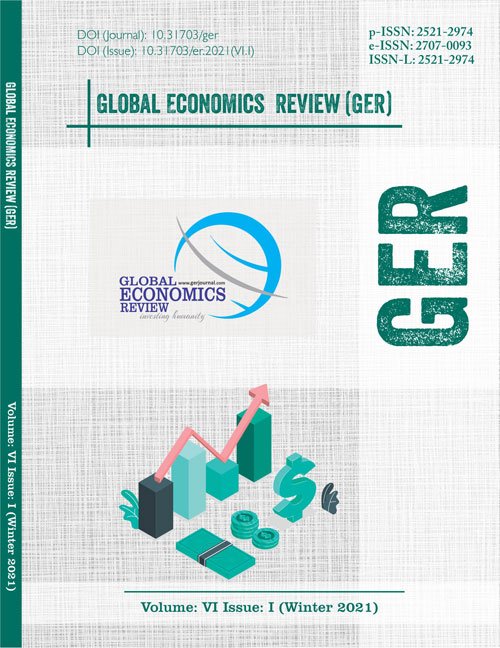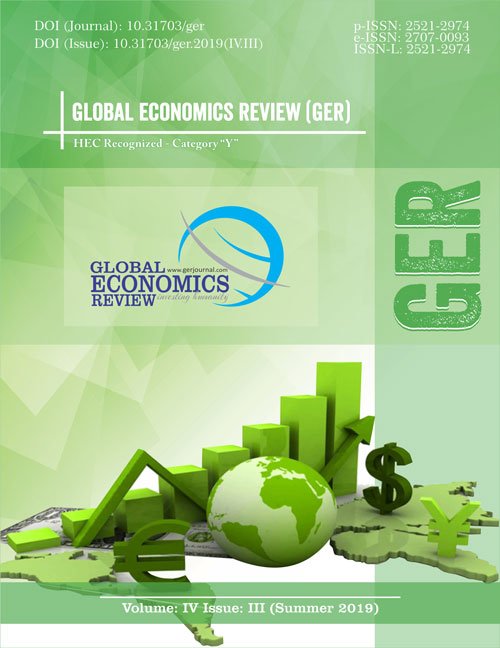01 - Investigating Factors Towards Adoption of Mobile Wallet Payment Services
http://dx.doi.org/10.31703/ger.2022(VII-IV).0110.31703/ger.2022(VII-IV).01 Published : Dec 2022
-
The goal of this study is to look at the effect of "perceived ease of use" (PEOU), "perceived usefulness" (PU), "perceived service cost" (PSC), "perceived credibility" (PC) and "customers' satisfaction" (CS) on consumers' intention to adopt mobile wallet payment services. "Customer satisfaction" (CS) was the mediator between PEOU, PU and IU. The study model is based on the model of "technology acc... Details
-
Mobile Wallet, Digital Payments, Technology Acceptance Model (TAM), Adoption of Technology, Consumer Intention
-
(1) Faraz Mahboob
Research Scholar, Mehran University Institute of Science, Technology and Development, MUET, Jamshoro, Sindh, Pakistan.
(2) Arifa Bano Talpur
Assistant Professor, Mehran University Institute of Science, Technology and Development, MUET,Jamshoro, Sindh, Pakistan.
(3) Mahvish Kanwal Khaskhely
Lecturer, Mehran University Institute of Science, Technology and Development, MUET, Jamshoro, Sindh, Pakistan.
02 - Attributes which Improve the Employer Brand of Private Universities in Afghanist
http://dx.doi.org/10.31703/ger.2022(VII-IV).0210.31703/ger.2022(VII-IV).02 Published : Dec 2022
-
Employer brand has become a topic of concern for scholars and policymakers recently. The primary aim of this study is to unveil attributes that constitute a higher education institution as an employer brand. The study at hand is a qualitative inquiry designed to unveil an employer brand's instrumental and symbolic components. This study was conducted in the context of private universities in the e... Details
-
Attributes, Employer Brand, Instrumental-Symbolic, Private Universities
-
(1) Abid Momand
PhD Scholar, Institute of Administrative Sciences, University of the Punjab, Lahore, Punjab, Pakistan.
(2) Aisha Rizwan
Assistant Professor, Institute of Administrative Sciences, University of the Punjab, Lahore, Punjab, Pakistan.
(3) Tayyeb Ali
Assistant Professor, Institute of Administrative Sciences, University of the Punjab, Lahore, Punjab, Pakistan.
03 - Impact of Fintech on the Financial Stability of Banks: A Systematic Literature R
http://dx.doi.org/10.31703/ger.2022(VII-IV).0310.31703/ger.2022(VII-IV).03 Published : Dec 2022
-
In recent decades, financial technology and stability have been debated and studied for decades. This study examines the relationship between financial technology (Fintech) and global bank financial stability. The study collected articles from research databases for this (Science Direct, Welly, Emerald, Springer Link, Google Scholar, and Research Gate). We map the financial technology–financ... Details
-
Fintech, Financial Stability and Literature Review
-
(1) Asghar Kamal
PhD Scholar, University of Management and Technology, Lahore, Punjab, Pakistan.
(2) Muhammad Sadil Ali
Research Associate, Department of Commerce, Allama Iqbal Open University, Islamabad, Pakistan.
(3) Muhammad Mahmood shah Khan
Assistant Professor, Hasan Murad School of Management (HSM), Lahore, Punjab, Pakistan.
04 - Problems in Implementing Adequate Equal Employment Opportunity Laws and Diversit
http://dx.doi.org/10.31703/ger.2022(VII-IV).0410.31703/ger.2022(VII-IV).04 Published : Dec 2022
-
Organizations need to be effective and timely manage diversity. Efficient diversity management within organizations helps them to build a satisfied and happy workforce that feels safe at the workplace. A happy workforce translates into higher revenues through satisfied and loyal customers. Equal Employment Opportunity is a means to achieve effective diversity management within organizations. Howev... Details
-
Equal Employment Opportunity, Diversity Management, Organizational Performance, Discrimination, Organizational Diversity, Gender Diversity, Gender Bias
-
(1) Nisar Ali Tunio
OGDCL, Tando Alam Oil Complex, Hyderabad, Sindh, Pakistan.
(2) Aamir Iqbal Umrani
Department of Business Administration, Madressatul Islam University, Karachi, Sindh, Pakistan.
05 - Investigate How Ethanol Production Effect Sugar Industry: A Case Study of UK &am
http://dx.doi.org/10.31703/ger.2022(VII-IV).0510.31703/ger.2022(VII-IV).05 Published : Dec 2022
-
This research shows how the ethanol process effect production in the sugar industry in UK & Pakistan. UK follows alcoholic process while Pakistan used a halal mode of production. This is a qualitative study. The data is collected through secondary sources. The primary data is gathered through an open-ended questionnaire. The goal of this project is to collect feedback from the targeted g... Details
-
Sugar Industry, Ethanol Process, UK, Pakistan
-
(1) Syed Waqas Ali Kausar
PhD Scholar, Department of Government and Public Policy, National University of Modren Languages, Islamabad, Pakistan.
(2) Imran Ullah Khan
Quaid-e-Azam University, Islamabad, Pakistan.
(3) Aisha Tahir
MPhil Scholar, Department of Econometrics, Pakistan Institute of Development Economics, Islamabad, Pakistan.
06 - Determinants behind the Choice of Money Transfer Channels: A Case Study of Pakis
http://dx.doi.org/10.31703/ger.2022(VII-IV).0610.31703/ger.2022(VII-IV).06 Published : Dec 2022
-
The study was designed to explore and analyze the determinants behind the choice of different channels of money transfer used by Pakistani migrants living in Dubai. 400 working-class Pakistani immigrants were taken as a sample. Data was collected through Non-Probability Convenient sampling technique. A rank order analysis was used to find out the respondent's level of preference and the mean value... Details
-
Money Transfer Channel, Pakistani Migrants, Dubai, UAE, Immigrants
-
(1) Naveeda Ali
MPhil Scholar, College of Home Economics, University of Peshawar, KP, Pakistan.
(2) Kauser Takreem
Professor, College of Home Economics, University of Peshawar, KP, Pakistan.
(3) Shaista Ali
Lecturer, College of Home Economics, University of Peshawar, KP, Pakistan.
07 - Family Economic well-being: the Role of Personal Religiosity and Preaching- rela
http://dx.doi.org/10.31703/ger.2022(VII-IV).0710.31703/ger.2022(VII-IV).07 Published : Dec 2022
-
The significance of religiosity in well-being is rapidly gaining attention. Personal religiosity may provide a subjective utility to the individual and effect positively, but not associated with the well-being of the family. Higher religiosity would require time. The present study have examined the influence of personal religiosity and preaching-relatedabsence of the household head on his family's... Details
-
Religiosity, Economic Well-being, Preaching Related Absence, Ordinary Least Square, Ordered Logistic Regression
-
(1) Nabila Khan
P.hd Scholar, Department of Economics, University of Peshawar, KP, Pakistan.
(2) Amjad Amin
Assistant Professor, Department of Economics, University of Peshawar, KP, Pakistan.
(3) Muhammad Saleem
Professor, Islamic Centre, University of Peshawar, KP, Pakistan.

 Volume X, Issue II (Spring 2025)
Volume X, Issue II (Spring 2025)  Volume IX, Issue III (Summer 2024)
Volume IX, Issue III (Summer 2024)  Volume IX, Issue II (Spring 2024)
Volume IX, Issue II (Spring 2024)  Volume IX, Issue I (Winter 2024)
Volume IX, Issue I (Winter 2024)  Volume VIII, Issue IV (Fall 2023)
Volume VIII, Issue IV (Fall 2023)  Volume VIII, Issue III (Summer 2023)
Volume VIII, Issue III (Summer 2023)  Volume VIII, Issue II (Spring 2023)
Volume VIII, Issue II (Spring 2023)  Volume VIII, Issue I (Winter 2023)
Volume VIII, Issue I (Winter 2023)  Volume VII, Issue IV (Fall 2022)
Volume VII, Issue IV (Fall 2022)  Volume VII, Issue III (Summer 2022)
Volume VII, Issue III (Summer 2022)  Volume VII, Issue II (Spring 2022)
Volume VII, Issue II (Spring 2022)  Volume VII, Issue I (Winter 2022)
Volume VII, Issue I (Winter 2022)  Volume VI, Issue IV (Fall 2021)
Volume VI, Issue IV (Fall 2021)  Volume VI, Issue III (Summer 2021)
Volume VI, Issue III (Summer 2021)  Volume VI, Issue II (Spring 2021)
Volume VI, Issue II (Spring 2021)  Volume VI, Issue I (Winter 2021)
Volume VI, Issue I (Winter 2021)  Volume V, Issue IV (Fall 2020)
Volume V, Issue IV (Fall 2020)  Volume V, Issue III (Summer 2020)
Volume V, Issue III (Summer 2020)  Volume V, Issue II (Spring 2020)
Volume V, Issue II (Spring 2020)  Volume V, Issue I (Winter 2020)
Volume V, Issue I (Winter 2020)  Volume IV, Issue IV (Fall 2019)
Volume IV, Issue IV (Fall 2019)  Volume IV, Issue III (Summer 2019)
Volume IV, Issue III (Summer 2019)  Volume IV, Issue II (Spring 2019)
Volume IV, Issue II (Spring 2019)  Volume IV, Issue I (Winter 2019)
Volume IV, Issue I (Winter 2019)  Volume III, Issue II (Fall 2018)
Volume III, Issue II (Fall 2018)  Volume III, Issue I (Spring 2018)
Volume III, Issue I (Spring 2018)  Volume II, Issue I (Fall 2017)
Volume II, Issue I (Fall 2017)  Volume I, Issue I (Fall 2016)
Volume I, Issue I (Fall 2016)